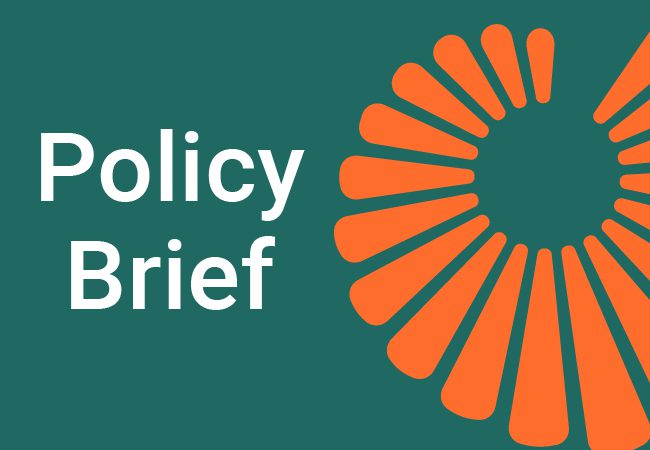Policy Brief: European Commission report highlights Ireland’s efforts to improve quality in EY and SAC

Ireland’s efforts to improve the coordination of its Early Years (EY) and School Age Care (SAC) quality assurance and development processes were highlighted as a case study of “inspiring practices” in the second report of the European Commission’s Working Group of Early Childhood Education and Care.
The Working Group, whose main focus for this report was the monitoring and evaluation of quality in Early Years education, was established in 2021 to support Member States as they implement the 2019 Council Recommendation for high quality ECEC systems and the EU Quality framework for Early Childhood Education and Care (ECEC). The objective of the EU Quality framework is to describe a system which can provide high-quality early childhood education and care for all children and its development.
Purpose of the Working Group’s report – Monitoring and Evaluation
The purpose of this Working Group report was to see how Member States can:
- ensure that monitoring and evaluation processes and results are effectively and efficiently used to improve Early Years education and care policies and to improve the quality of its provision across all levels of the system.
- coordinate monitoring and evaluation processes and tools across all levels of the system
What policy developments did the Working Group propose?
To enable improvements in ECEC, the Working Group would like to see a monitoring and evaluation system that is coherent, coordinated, and optimised across all levels of the system. The Working Group provided the following policy developments for Member States’ consideration: –
- Establishing a shared understanding of quality across the entire Early Years sector.
- Consulting with all stakeholders on relevant data to improve quality.
- Developing data collection tools and IT infrastructures that are appropriate, easy to use, effective, coordinated, and secure.
To ensure that all children – and their families – can benefit from the best possible educational opportunities to nurture their potential and thrive within the communities they are living in, the Working Group recommends that agencies with responsibility for monitoring and evaluation have a clear understanding about their role, and that they adopt a culture of quality improvement at a practice and policy level.
What did the report say about Ireland and quality for children in the Early Years and School Age Care sector?
Ireland’s efforts to improve quality in the Early Years (EY) (and School Age Care (SAC)) sector were described as an “inspiring initiative” to improve quality assurance and development.
The report outlined the steps that have been taken to improve quality in our EY and SAC sector:
- Commitment to reform: In response to data and inspection findings which found that “the quality of regulated ECEC is highly variable, and that implementation of the national quality and curriculum frameworks for ECEC is inconsistent across services”, Ireland committed to “progressively reform the ECEC (and school-age childcare) regulatory and inspection systems and strengthen quality assurance.”
- OECD Country Policy Review of EY/SAC system: Ireland requested the OECD to carry out a country policy review of EY and SAC sector quality in Ireland, including a particular focus on ways to strengthen the quality assurance and improvement system.
- Government accepts the OECD recommendations: The OECD reported its findings in 2021 and made several recommendations which the Irish Government accepted. These included:
- Reviewing the statutory steps available for Tusla to deploy in cases of services that are falling persistently short of expected standards,
- Strengthening Tusla’s ability to take enforcement action.
- Increasing the ease of access for parents to user-friendly information about the quality of services.
- Develop a stronger and more coherent infrastructure for providing quality development support for the sector.
- Strengthen arrangements for enabling appropriate data sharing between the national bodies with and interest in quality monitoring and improvement.
- Two inter-agency working groups established: The Department of Children, Equality, Disability, Integration and Youth (DCEDIY) established two working groups in response to the OECD recommendations:
- an Inspection Streamlining and Coordination Working Group, involving DCEDIY and the two inspectorates, aiming to strengthen coordination and collaboration between the inspectorates, and;
- a Quality Assurance and Improvement Working Group, involving DCEDIY, the two inspectorates and relevant agencies involved in providing quality supports to ECEC settings, aiming to strengthen the linkages between the inspectorates and the quality support agencies.
- New legislation: Following a 2019 documentary which showed serious and significant breaches of regulation in three EY settings, the Government approved policy proposals to give the Tusla Inspectorate greater enforcement powers. The General Scheme of the Child Care (Amendment) Bill 2023, is expected to be introduced to the Dáil in autumn 2023.
Early Childhood Ireland met with the Joint Oireachtas Committee on Children, Equality, Disability, Integration and Youth in May 2023 to discuss the General Scheme of the Child Care (Amendment) Bill 2023 which, when enacted, will be of huge significance for children and families in Ireland. Our Policy Brief about the Bill is here.
If you have any questions on this legislation or other related policy, the policy team can be contacted at policy@earlychildhoodireland.ie.









